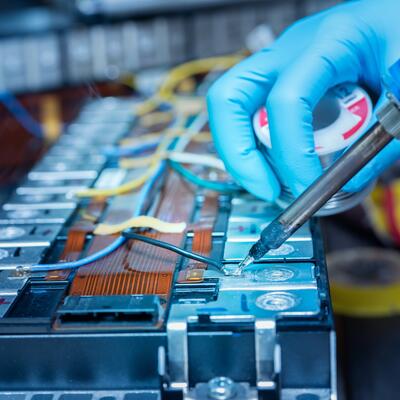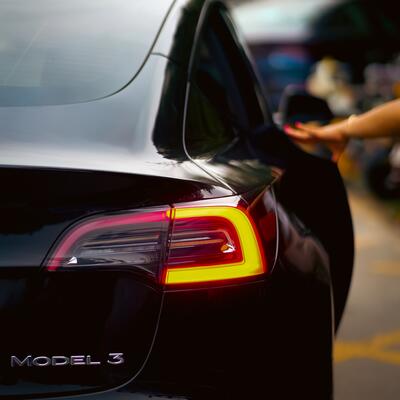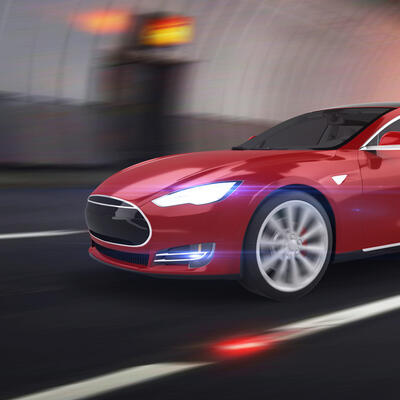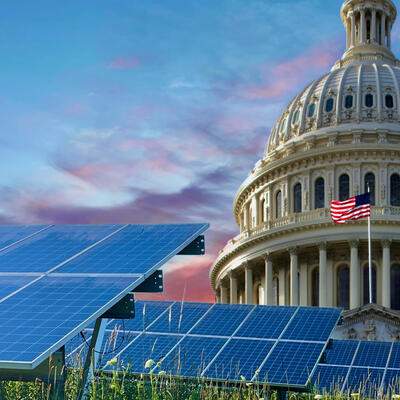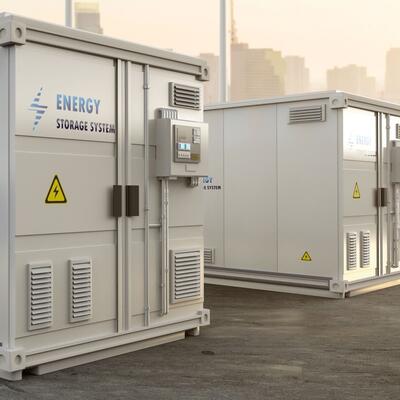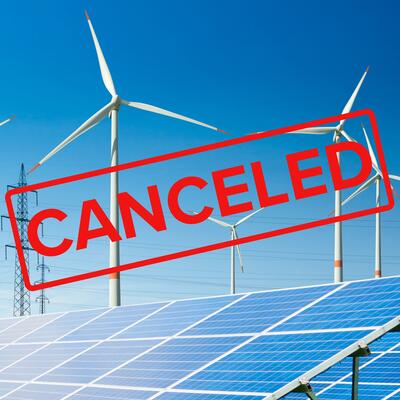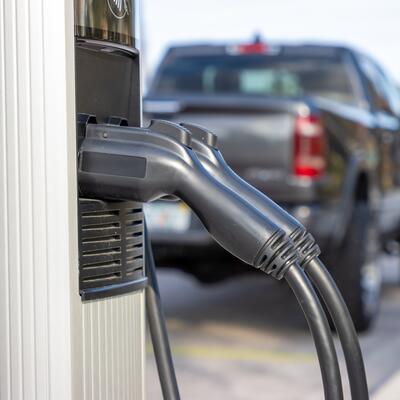
Is the EV Transition Stuck in Neutral?
Guests

Camila Domonoske

Dan Bowerson

Matthew LaBrot

Mike Murphy
Summary
The Biden administration set ambitious goals to rapidly electrify the U.S. car market. But in spite of significant government incentives provided in the Inflation Reduction Act, consumer demand hasn't been as high as predicted. Last year, Bloomberg NEF was projecting electric vehicles (EVs) would be nearly half of U.S. car sales by 2030. Now, they’ve just revised their projection down to less than 30%.
“Automakers expected to sell a lot more electric vehicles over the past two years than they really did. EV sales did go up. But it was not what they had hoped for,” says Camila Domonoske, a correspondent for NPR’s Business Desk. In spite of the fact that there are now many more models on the market and range has improved significantly, that slowing demand is attributed to continuing range anxiety and higher costs for EVs compared to internal combustion engines.
Meanwhile, there’s been a massive policy shift as President Trump is trying to cut credits and incentives that have helped boost domestic EV production while setting new tariffs on critical materials like steel.
“These facilities and supply chains are massive and complex, and they can't be relocated or redirected overnight, says Dan Bowerson of the Alliance for Automotive Innovation. “Certainly additional tariffs are going to increase the cost on American consumers, potentially lower the total number of vehicles sold in the U.S.”
With China leading the global electric vehicle market, EV experts across the board agree we need to step up to avoid being left behind.
“China makes three times as many cars as we do cars and light trucks,” says Mike Murphy, former Republican political strategist and CEO of the EV Politics Project.
“And so the minimum we need to do, not forever, but for a few years, is help support a vibrant EV market here to muscle up our brands, get their manufacturing lined up… It's not just tree hugging Biden left wing stuff. No, no. This is geopolitics. It's whether or not we have an American auto industry in a decade or two, and it's millions of good manufacturing and engineering jobs we want to keep here.”
Resources From This Episode (5)
Full Transcript
Note: Transcripts are generated using a combination of automated software and human transcribers and may contain errors. Please check the actual audio before quoting it.
Ariana Brocious: This is Climate One. The Biden administration set ambitious goals to electrify the U.S. car market. But consumer demand hasn't been as high as predicted.
Camila Dominaske: Automakers expected to sell a lot more electric vehicles over the past two years than they really did. EV sales did go up. But it was not what they had hoped for.
Ariana Brocious: President Trump is trying to cut credits and incentives that have helped boost domestic EV production while setting new tariffs:
Dan Bowerson: Certainly additional tariffs are going to increase the cost on American consumers, potentially lower the total number of vehicles sold in the US.
Ariana Brocious: Regardless of politics, EV experts agree we need to step up to avoid being left behind.
Mike Murphy: It's not just tree hugging Biden left wing stuff. No, no. This is geopolitics. It's whether or not we have an American auto industry in a decade or two, and it's millions of good manufacturing and engineering jobs we want to keep here.
Ariana Brocious: Is the EV Transition Stuck in Neutral? Up next on Climate One.
I’m Ariana Brocious.
Austin Colón: I’m Austin Colón.
Ariana Brocious: And this is Climate One.
[music change]
Ariana Brocious: Around the turn of the nineteenth century, electric vehicles made up about one-third of the cars on the road. But by the 1930s, they had almost disappeared.
Austin Colón: Yeah. Internal combustion engines really took off as gasoline became cheap and Ford started making cars everyone could afford. At the time, electric cars were more expensive, slower and hard to charge in rural areas without electricity. And apart from a brief resurgence of interest in the 1970s, that’s pretty much how it was until the 90s.
Clip from the Simpsons: Welcome to the Electric Car in the Future, sponsored by the Gasoline Producers of America. “Hello, I am an electric car. I can't go very fast or very far…”
Austin Colón: (laugh) Well, maybe what the Simpsons suggested was true initially, but as an EV owner I can attest to how incredibly FAST, and far, electric vehicles can go. I’ve done at least six cross-country roadtrips in my Model Y. (And don’t tell my parents but I have gone from zero to 135 in seconds on the Bonneville Salt Flats)
Ariana Brocious: Yeah, that’s incredible. Also a little terrifying! Tesla came on the scene in 2008 and the EV industry has been rapidly expanding and evolving since then, with pretty much every major car manufacturer developing electric models.
Austin Colón: There was a period of slow growth as companies developed the technology and began to build charging infrastructure. Yet just a couple years ago economists and others predicted the US was at a tipping point of mass adoption of EVs. We did a show on this – and talked about the US following the path of explosive EV adoption some other countries have seen.
Ariana Brocious: Right. But that’s recently changed. Last year, Bloomberg NEF was projecting EVs would be nearly HALF of US car sales by 2030. Now, they’ve just revised their projection down to less than 30%.
Austin Colón: That’s disappointing. But I’ll note it’s still better than where we are today – at about 10 percent. There are several reasons for the lowered expectations, and we’ll dig into those today. The reality is that there has been a massive policy shift in the last six months. And that’s made it extra tough for American automakers. Camila Domonoske is a correspondent for the NPR Business Desk. She talked with our cohost Kousha Navidar to provide the big picture of where the US electric vehicle market stands right now.
Camila Domonoske: We have gone from a president in President Biden, who set as a top priority selling more electric vehicles in the US and had this combination of carrots and sticks, both incentives and regulations to make that happen. Right? And we have now gone to a president in President Trump, who has been openly somewhere between skeptical of, to actively hostile toward electric vehicles with this window of warming when he was BFF's with Elon Musk, which that door now seems to be fully closed, right?
Kousha Navidar: Slammed shut.
Camila Domonoske: Slammed shut for now, who knows? But, but, we've certainly seen this is not just about how he talks about electric vehicles, right? This is actually about rolling back tax credits and reducing regulations, not allowing California to set their own regulations. This is all huge. It's happening at the same time that companies are also dealing with the fact that demand from customers hasn't been as high as they thought it was gonna be. Automakers expected to sell a lot more electric vehicles over the past two years than they really did. EV sales did go up. But it was not what they had hoped for. And so that market pressure has caused companies to really slow down how quickly they're planning on making EVs, how much money they're putting into battery plants and, and EV production lines. So those two things are converging and the impact is huge.
Kousha Navidar: Do you feel like there's any point at which companies tire of basing their planning on the US government and they just throw their hands up and they're like, all right, peace. I'm out. Like, I'm gonna stop making EVs.
Camila Domonoske: So to the first half. Are they sick of it? Yes. Yeah. And certainly companies have said, some of them, that they are not basing their decisions on policy at all, that they're just looking at what they think that the market demand will be and what's happening globally. There is still a real belief in the auto industry that EVs are the future. That this is the emerging growing technology and that gas vehicles are shrinking. Now if that's happening a lot slower than you thought, you're gonna sell a lot more gas vehicles, but you still don't wanna cede the future to your rivals. And you know, people who drive EVs, they're fast, they're quiet, they got great pickup, they're low maintenance. Like those are valuable attributes to an automaker. Even if you put on very narrow blinders and ignore the climate and the environment and policy completely, there's still a market. There's still a market for a quiet car that can go zippy right off the line, and you never have to change the oil.
Kousha Navidar: I am happy that you brought up the global market. I wanna get to it in a second, but before we do, let's look at the US market a little bit more. 'cause I am hearing from you there is slowing demand, or at least it's not increasing as quickly as expected. Are there positives to the US EV market right now?
Camila Domonoske: Compared to what, I guess is one way of asking that question compared to a couple years ago? Uh, I think most indicators are trending negative compared to 10 years ago. It's a totally different world. Right. Like there are way more options that are available now than there were for a very long time. When I started covering electric vehicles, there were no large SUVs that were electric that you could buy at all. Zip zero. And that's a huge market in the US right? So the fact that now there's, there's the V nine and it's a great vehicle, like the, you've got the Rivian SUV, and charging is improving. There was data out of JD Power of how satisfied people are with their public charging experience. And it's improved significantly early this year. And partly we're seeing the Tesla network is opening up to other brands, which means people have a lot more chargers they can use. And eventually we are starting to see, you know, the next model year and the next generation of cars are coming out with that NACS charger, the Tesla style adapter built into the car. And eventually we're gonna be in that world where all the chargers are compatible with all the cars. They're all using NACS. And another improvement that's happened in charging is more chargers are now letting you plug and charge where you plug in and then your car starts charging right away and you don't have to wrestle with the credit card reader. People who drive Teslas right now are laughing because they have always lived in this world, but it is a major improvement for all these other brands and that, that, that's significant.
Kousha Navidar: Okay. So let's go to the global perspective now. Outside of the US, how's the market looking globally?
Camila Domonoske: It's booming in China. Somewhat problematically booming from the automaker perspective. There's too many companies in China making EVs too cheap right now. In fact, sort of a wild problem for us in the United States to imagine having about half of all the new vehicles that are sold in China right now are electric or plug-in hybrid. Europe, it's growing, it's significantly larger than it is in the US and, there's still a commitment from European policymakers to have this growth. And then globally, one interesting thing that's happening is that China is exporting electric vehicles to a lot of other car markets. and they're, they're doing well there too.
Kousha Navidar: The US is not one of those markets, right? We are not importing Chinese EVs.
Camila Domonoske: Almost none. There's both a hefty tariff on Chinese EVs that was put in place before the current tariff palooza. This was under the Biden administration. and then there's also a ban on Chinese connected car technology, over some concerns about national security. And, you know, new cars are basically rolling surveillance devices, they're packed full of cameras and, and microphones. And so, uh, Washington DC has been concerned, um, about, about that from Chinese vehicles. And there's also a hefty dose of, you know, good old fashioned trade protectionism here. Um, but yeah, for now, really those, the cheap and quite compelling, very fast charging five minute charge high tech vehicles that the Chinese automakers are making you, you pretty much can't get here in the us.
Kousha Navidar: Do you feel like that puts the US in a disadvantage in any way?
Camila Domonoske: Well, certainly from a consumer perspective, these are cheap vehicles. Vehicles that, you know, they wouldn't be as cheap in the US as they are in China, right? The $10,000 car wouldn't, wouldn't be happening here, but twice that $20,000. You can't get a new vehicle for $20,000 in the US right now at all. So yeah, from a consumer perspective, we are not getting access to some of the cheapest and, and most cutting edge vehicles in the world. From an economic perspective, there is a case to be made for not allowing those vehicles to swoop in, and undermine what's a huge industry in the United States. Eventually, to be clear, the US automakers have to be able to compete with what the Chinese are making, like a walled garden where they're only making pricey behind the curve on technology vehicles just for the US market. That's no good for us consumers or for these companies that would very much like to be global automakers. So yeah, eventually they have to be able to compete, but there have been serious concerns about Chinese subsidies distorting the market to a degree that is unfair for companies in the US to, to try to compete with. And there are a lot of jobs on the line. The US auto industry is a huge employer.
Kousha Navidar: Yeah, let's talk about Tesla. I mean, what a story. They once basically owned, right? Go from like basically owning the US EV market and now the sales, the brand reputation are in free fall. It's embroiled in this like political intrigue playing out on Twitter, X, whatever you wanna call it.
Camila Domonoske: X, truthsocial.
Kousha Navidar: What's happening at Tesla?
Camila Domonoske: Yeah, so Tesla still is far and away the biggest EV brand in the United States. It's the number one seller. and, and number two is not close, but compared to how thoroughly it used to dominate. It is seeing its slice of that pie shrink, and it's really alienated a lot of shoppers. Right. The protests that are happening, the, the, the bumper stickers folks are putting on, say they bought them before Elon went crazy. Like these things are, are real. and it's having an impact. Elon Musk says that it's not, but it's pretty clear that this is meaningful.
Kousha Navidar: How has the drop in Tesla sales affected the EV market overall?
Camila Domonoske: That's an excellent question. It could be a contributing factor for sure, because Tesla is such a big part of the market. That said, we are seeing a lot of people who were interested in Tesla's turning to other brands.
Kousha Navidar: Okay. The number one concern people always raise to me is range. How far is my car gonna go? Am I gonna get stuck on the side of the hot highway? Are ranges improving on EVs?
Camila Domonoske: Yeah, they are. They've, they've gone up compared to several years ago. You know, 300 miles is pretty standard now. It's also, you know, Americans. We can drive a really long way. Like you're asking about sort of the US compared to the global market. Like it's not just policy differences, we're also, we're different about our cars and we're different about how far we think is a reasonable distance to get in your car and drive. So that's real. It’s less of a risk these days about getting stranded on the side of the road. In the very early days of EVs, it was literally like, am I going to be able to make it to a charger? We're well past that point, and now it's really more about, am I going to have to stop and charge for longer than I want? Like, is it gonna be inconvenient for me to charge? I remember interviewing Jim Farley, the CEO of Ford and he was like, we gotta stop calling it range anxiety. We gotta call it charging anxiety. It was driving him crazy. 'cause it's, it's really about can you charge while you're on a snack break on your road trip that is a place where you're fine stopping and it's a 15, 20 minute charge that the Chinese have these five minute charges. Right? At that point, it doesn't matter if you can go 600 miles without stopping if the stop is reasonable, but if the stop is unreasonable, if you are stopping at, say a car dealership where there's nothing to nothing to eat, you can't go to the bathroom 'cause it's closed. Like, you know, that's not a great stop. If you're stopping for 45 minutes. I have a Chevy Bolt ,that's an hour long charge stop. Like, that's not convenient.
Kousha Navidar: So I hear you talking about two different forms of anxiety here. One is, am I gonna run outta juice? Which isn't really as much of a concern or even a concern than it used to be. And then the other is, how long am I gonna waste at a empty weird stop generally kinda get on my day. So with that in mind, do you feel like there is a sweet spot for EV range that automakers are, either reaching for or have found?
Camila Domonoske: Yeah, it's, it's such an interesting question 'cause it keeps going up. What people say they want keeps increasing, right? You could actually see in the survey data, like how far would an EV have to go before you would buy it. Like the number keeps creeping up, because people said it was 400 miles. Well, now you can get a 400 mile ev. People are like, well, 500 miles, 600 miles, But if the charging were fast enough, you wouldn't need that long of a range, which means you wouldn't need that big of a battery, which is super helpful from a cost perspective. I think 250-300 could work for a lot of people, which is really where we are now. It's, but it would have to be paired with charging that people experience as being convenient.
Kousha Navidar: When you use that phrase, super fast, how fast are we talking? Like what is one, two generations of technology, have in store for us?
Camila Domonoske: Well if you look at what BYD in China has right now, right, it's, they're talking about putting 250 miles of range on in five minutes.
Kousha Navidar: Okay. Reports of auto manufacturers stepping back from EVs are common. Simultaneously, we see brands like Hyundai investing in EV plants, like. There is one in Georgia right now. So what's the, what's the reality of the situation for manufacturers? Are they just staying the course? Are they pumping it up? Are they actually stepping back when it comes to manufacturing EVs?
Camila Domonoske: They're, they're slowing down is what I would say. I went to the grand opening of that Hyundai Meta Plant in Georgia, which was announced a couple years ago with a lot of Fanfares being a dedicated EV manufacturing facility. It was only gonna make electric vehicles and they're now going to make hybrids there. As well. And at this grand opening ceremony, they did not mention the word electric or battery or climate or green once, right? So there's both like a vibe shift in how much companies are talking about this. And also a material shift in the fact that, you know, it was gonna be all ev and now they're adding hybrids. A lot of automakers have slowed down their plans. They are pushing them out. Ford, GM, Honda, Mercedes. Companies that are still planning on investing a lot in EVs, in many cases are doing it more slowly than they said. So it's totally fair to say that the industry is slowing down its investment in electric vehicles, its transition to electric vehicles. Volvo was going to be a hundred percent electric like tomorrow, basically in auto industry terms by 2030, not anymore, right? So, there has been a slowdown, not a pivot to zero, they're not saying we're not gonna make EVs, but it's a meaningful shift in the pace for sure.
Kousha Navidar: So where do you think the market goes from here?
Camila Domonoske: I think there will be more options for electric vehicles, not as fast as people had hoped. They're going to get better, the batteries are going to be faster, charging range is gonna improve and they're gonna be lighter. They're not gonna get better as fast as they're getting better in China. I think EV sales will grow from where they are now. Counting plugin hybrids in about the 10% range of the market. They're not going to grow nearly as fast as certainly the Biden administration had hoped, or climate advocates who have been, you know, hoping that EVs would massively reduce consumption of gasoline and not as fast as, as those folks had hoped either.
Kousha Navidar: Camila Domonoske is a correspondent for NPR Business Desk. Camila, thank you so much for joining us.
Camila Domonoske: Thank you.
Austin Colón: Coming up, a former Tesla employee talks about how the brand’s image and sales have suffered from the political activities of its founder and CEO:
Matt LeBrot: We are not the problem. Our products are not the problem. Our engineering service and delivery teams are not the problem. The problem is demand. The problem is Elon.
Austin Colón: That’s ahead, when Climate One continues.
Ariana Brocious: Help others find our show by leaving us a review or rating. Thanks for your support!
This is Climate One. I’m Ariana Brocious. Just a couple years ago, the auto industry seemed to be all in on EVs, and now we're seeing multiple automakers delay or outright cancel EV models. I talked with Dan Bowerson, Vice President of Energy and Environment Policy at the Alliance for Automotive Innovation, about the industry's perspective on the transition to electric vehicles.
Dan Bowerson: I would say the industry is still fully supportive of that transition to electrification. You know, auto manufacturers, battery suppliers and other suppliers have committed over $130 billion in the US to vehicle electrification. Uh, that's created over a hundred thousand jobs. The issue is we can't get ahead of the market. And I think, you know, a couple years ago, there was high hopes that the market would be there, but the market just wasn't as ready as policy makers. And I think an industry thought they may be. So a lot of factors at play there, but certainly, the charging infrastructure, which has been cited a lot, is a big factor. I think there needs to be some realignment to make sure that the regulations aren't getting too far ahead of the market.
Ariana Brocious: Yeah. So to unpack that a little, what are the primary reasons as you understand, for why there is not more demand from consumers for electric vehicles?
Dan Bowerson: Yeah, I think there's a number of factors. I already mentioned charging infrastructure. The rollout has not been, I think, as fast as we had hoped. EV adoption is actually outpacing charging installation. Obviously the cost aspect of it is certainly an, uh, impact. The average price of an EV is about $12,000 more than the average price of a, a regular internal combustion engine vehicle. So that's certainly a lot at play and I think it's just, some of it's the uncertainty. You know, we've hit kind of the 10% EV penetration rate. But that next 10% is really going to take a lot more and need more confidence,in charging infrastructure and cost and for those living in apartments or condos that they'll have access to home charging just like those that have a garage where they can charge at night. So I think it's just some of that uncertainty and assuring that those things will be in place for additional customers.
Ariana Brocious: Yeah, because EVs are actually still cheaper over the life of the vehicle than a gas car. Is that right?
Dan Bowerson: They are. The total cost of ownership is, but I don't think the typical customer, the typical consumer is focused on that. I think the typical consumer is looking at the price of the vehicle as they're purchasing it. They're not looking at how much I could save over a 10, 12 year period with this vehicle.
Ariana Brocious: Yeah. Okay. And so that shift in, automaker investment that we're seeing, you're chalking that up more to consumer demand, or is it also influenced by government policy? How are those factors interacting?
Dan Bowerson: I think it's both. I think there's been a desire and certainly there's been some incentives to onshore domestic EV battery production and EV production. I think that's already underway. That was underway even before the inflation reduction act. But I do think that helped stimulate that issue is you can't change supply chains overnight, right? That takes time for that to happen.
Ariana Brocious: Yeah. Quite a few companies touted the new battery or other EV component factories that were made possible or greatly helped to become possible. because of the inflation reduction act. Now many of those subsidies and grants are being targeted by President Trump's one big, beautiful bill. So I'm in southern Arizona and Juan Ciscomani, a Republican congressman, a representative who has Lucid Motors here in his district. I think he's been sort of defending these investments to try to preserve this new factory jobs, et cetera. Are we seeing enough of that pushback among lawmakers who are concerned about losing investments in their home districts to have an effect on what's happening at the national level?
Dan Bowerson: I do think you're seeing that play out. I think a lot of the investment, as you mentioned, you know, Arizona and a a red district, there's a lot of those similar ones in the Southeast where there's been a lot of investment in electrification. And those representatives certainly don't wanna see that money and those jobs go away. So I think that has been a very powerful voice of, if we're going to make changes, make sure that there's enough time to get those facilities up and running before pulling that out. So I do think it's been, that has been probably the most powerful voice. Whether or not it holds true, uh, remains to be seen.
Ariana Brocious: One aspect of the budget bill that surprised me was this call for the FCC to auction off large portions of the federal spectrum rights, and this would affect wireless safety and convenience functions in vehicles could make them stop working. This is things like collision safety software and real time EV charging routing. So if that were to take effect in this law, what would be the impact on the, on the car industry, on our cars, really?
Dan Bowerson: We've definitely urged the Senate to preserve some of that spectrum for automotive, that ultra wideband spectrum. As you mentioned, today it's used for a lot of vehicle safety applications and access to real-time EV charging. But other potential uses of that is, short range radar systems that would prevent collisions with pedestrians or cyclists, some anti-theft capabilities. So by auctioning that off, it puts some of those at risk and have to find other opportunities.
Ariana Brocious: Another element in play here is of course, the tariffs put forward by President Trump. He's been imposing tariffs that could affect the auto industry more than many others. So how are automakers navigating this, you mentioned supply chains. Is it shaping which kinds of cars they make, where they make them if possible?
Dan Bowerson: Yeah, as you know, it's a global industry and parts oftentimes cross borders a number of times before they actually make it into a vehicle. I would say the industry certainly. Committed to building and investing in the US. We've already seen this. There's the, the industry is worth 1.2 trillion into the economy, which is about 5% of the GDP. But again, these facilities and supply chains are massive and complex, and they can't be relocated or redirected overnight. So your point on the tariffs, certainly additional tariffs are going to increase the cost on American consumers, potentially lower the total number of vehicles sold in the US in terms of types of vehicles. I think that still remains to be seen. I think there's a lot of that playing out right now in real time and I just don't have a good sense of if we're gonna see a shift from the types of vehicles that are built, say in the US versus those that are potentially still imported.
Ariana Brocious: So we've been talking mostly about electric vehicles, strictly electric. where do hybrids, especially plug-in hybrids, fit into this picture in terms of where automakers are putting their investments, their research, you know, new, new models and so forth.
Dan Bowerson: Yeah, I see hybrids personally as a great opportunity. and you're seeing manufacturers now that are looking at their portfolio and making sure that they're, again, meeting the customer where they are and all, for a lot of them hybrids and specifically. Plug-in hybrid electric vehicles can help fill that role. Plug-in hybrids can suit the need of your daily commute on electricity without requiring an expensive charger installed at your home, but you still have that gas engine for those long road trips. So for a lot of people, that is the ideal. At this stage.
Ariana Brocious: Where do you think the EV industry goes from here, in the US?
Dan Bowerson: Yeah, I think it still continues to grow. I do think it's, it's a slower pace than what we've seen in the past, though, those year over year growth. We've already seen them coming down over the past three years. So that's going to continue to happen, but I do think we're gonna continue to see a rise. There's more and more products coming onto the market every quarter. Just in the first quarter of this year, there were 149 different electric vehicle models sold in the US. So the products are coming, the products we're seeing more and more crossovers, sport utility vehicles, pickup trucks. Things that customers aren't having to make that convenience sacrifice their, the vehicles can do what they need to do. So I think it's gonna continue to grow. Likely not at the pace that we had maybe seen in the past or expected to continue. But we'll still see electric vehicles grow.
Ariana Brocious: Yeah, Well I am the owner of a used Nissan Leaf, which has been real fun for getting around town at least. What do you drive?
Dan Bowerson: So I drive a 2019 Jeep Wrangler.
Ariana Brocious: Okay, so not an EV.
Dan Bowerson: Which I will say, it was the lease, the next purchase was going to be likely a plugin hybrid, but at the time was COVID and the, uh, chip crisis. So the cost was detrimental to making that decision. So.
Ariana Brocious: Yeah, well, I mean, that's a real example, right? I mean, there are many factors that go into what you buy. Dan Bowerson is Vice President of Energy and Environment Policy at the Alliance for Automotive Innovation. Thanks for joining us on Climate One.
Dan Bowerson: Thank you so much. It's been a pleasure.
[music cue]
Ariana Brocious: So we heard earlier in the show about the market power of Tesla–and we know that company has been leading the electrification wave here in the U.S. But that’s changed in the last few months.
Austin Colón: No kidding. I bought a used Model Y a couple of years ago and was super excited. But I didn’t realize I’d signed up for driving around a political symbol.
Ariana Brocious: And it’s not an exaggeration to say that Elon Musk’s actions have changed the company’s financial position. And many people, including Tesla employees, aren’t happy about it. Our co-host Greg Dalton spoke with Matt LaBrot. He was a Tesla employee who became so fed up that he published a website called “Tesla Employees Against Elon.” He was subsequently fired, allegedly for "using company resources to build a website that did not align with the company’s perspective."
[music cue]
Greg Dalton: Why did you initially wanna work for Tesla?
Matt LaBrot: I spent a few years living in Seattle working at Starbucks, and that was early Tesla days, so I saw a few Roadsters rolling around at that time. It was really cool to see those and then to find out that they were electric, and then to learn more things about what Tesla was doing and the mission that they were focused on. All of that was really not just cool to me, but important to me as a relatively younger person. At that point, I was looking at Tesla as a company that could make electric vehicles cool, could help sustainability long term and see where that could go.
Greg Dalton: Right, and you worked there for over five years. What was your job like? What did you do?
Matt LaBrot: So I started in Southern California as an assistant sales manager, so that's where I brought my retail experience from Best Buy and Starbucks, and even real estate before to this fresh up and coming, vehicle company. Uh, so I started in sales in the field and moved from Southern California to the Bay Area, where I eventually left the field and became a sales and delivery program manager focused on training. So my most recent role was to create sales and delivery training content for North America, about 2,500 employees.
Greg Dalton: And what did you think of Elon Musk, when you started working there?
Matt LaBrot: Yeah. I thought about him as this very cool figurehead that was accelerating the world's transition to sustainable energy. And he was a person who was able to, it's hard to say, make it cool because of course him being on stage has never screamed Cool. but it was cool enough, and the product was so cool that it was able to get people interested in EVs in a way that they hadn't been before. And that made him cool.
Greg Dalton: There's no doubt the auto industry would not be where it is regarding EVs if it weren't for him, Detroit and, uh, Tokyo would've never embraced EVs. he was a disruptor. When did your opinion of him start to change?
Matt LaBrot: my opinion changed a couple of different times. First, it changed when I was just a regular frontline employee that had to deal with my CEO tweeting things that weren't real, and I had to be the one that would break it to the customer that, oh yeah, no, sorry, full self-driving isn't actually out yet and know our car can't do that or that or that. So it sullied pretty quickly there. but you know, you could still look at him as well. He's still driving sales and all of that. But then it really started to change with the Twitter acquisition, and then very heavily during the Trump second presidency, where we started to see him supporting a candidate that a lot of us knew didn't believe in the same foundational things that most Tesla employees did. And even just saying, you know, accelerating the world's transition to sustainable energy. We all knew that. That candidate didn't support that mission, and that was really difficult for us. And then I saw that very quickly affecting our customers and our total sales. And as a career sales person and person who believes in this mission, that was really difficult to see a negative impact on the company because of that.
Greg Dalton: Right, but Tesla has been controversial from the beginning. Was there a recent real inflection point where he really became toxic to the brand?
Matt LaBrot: Where he soured most customers was through the political decisions that he started making, you know, we'll call it second half of 2024. That was when it became very difficult for customers who just believe in the mission to think that purchasing a Tesla is a good idea when they're supporting somebody who's taking the money that he's making from these sales and is putting them into something they don't believe in.
Greg Dalton: And you eventually created a website called Tesla Employees Against Elon. That's a pretty strong action to take against the CEO of the company you're working for. take us to that moment where you're like, okay, I'm gonna do this. I'm gonna publish this site.
Matt LaBrot: Yeah. What drove me to do it is that Tesla didn't, there were so many opportunities for Tesla to even separate themselves from Elon in the aspect of saying, Hey, our CEO is doing this with his own private funds, but Tesla is still focused on this mission. You know, there were so many opportunities for them to say that and they didn't. When the salute happened or the alleged awkward gesture, whatever you want to call it happened. That to me was a huge turning point because I kind of was able to, to let a little bit of air out and I thought, oh great, like Tesla's gonna be able to, they're finally gonna do something here because your CEO can't go on stage and do that. And then not only did they not take a negative action, they, on their personal Twitter account, they put him up there as, this is still our guy, this is still the person that we support. And then they had a town hall meeting or an all hands call as we would call them. And not only was he the only person who presented on that all hands call. That all hands call was live streamed to everybody. And that was Tesla really saying, this is our guy, he's gonna continue to be our guy. We don't care what he does. And once that happened, that's when this starts to fester in me a little bit more of they're not gonna do anything. And the repercussions to this are gonna continue to negatively impact our business and our jobs. You know, Tesla employs a ton of people in California, a ton of people across North America building and growing a factory in Texas. As sales start to decline, this will have negative impacts on jobs. So that is probably the biggest catalyst of me deciding, okay, I need to do something. And that's where the website came from.
Greg Dalton: And at that moment when you're publishing it, what did you expect to happen and how does that compare to what did happen?
Matt LaBrot: Yeah. Um, you know, I didn't really know what I was expecting. I knew that this message needed to get out there. I was really hoping that it would be picked up by, by media and just be shared more and pushing this conversation that we're not all happy with the course that we're taking. And what ended up happening is a few days after I posted. Well, a few days after I posted, I got fired. But also aside from that, a few days after I posted the Wall Street Journal wrote an article that said, the board is looking for a new CEO and somebody sent me that. And I was like, okay. I, first of all, I didn't think that I did that. I just, you know, thought that this was a confirmation that things were heading in the right direction. And within 30 minutes of getting that article sent to me, officialTesla account says, Nope, that's not true. Elon, of course says that's not true. And so with my mission and having written the letter and trying to get this, this information out there, I wanted to tell other employees that they're not alone in feeling this way. Enough people have reached out to me, even people that I was shocked to hear from, people that I didn't think agreed with me, a lot of them reached out and said, I don't know what to do and I don't know if I'm supposed to leave and, you know, make a better decision on the outside or if I should keep fighting from the inside.
Greg Dalton: Right, and there's been some real, dramatic brand destruction here because of Musk's foray into politics. In 2021. the Harris Axios poll on brands had Tesla ranked as number eight. It's currently number 95. That is a dramatic drop for a company self-inflicted, really. Does that sit with what you're seeing in terms of that, you know, that tremendous brand damage?
Matt LaBrot: Yeah. So with that, I think it's, it's so important to call out that Teslas have only continued to get better since 2021. Build quality has gotten better, safety has gotten even better, range. Uh, though not a huge number change, but efficiency has been improving, uh, year over year. All those things have continued to get better. Service has gotten better. Delivery experiences, like all of these things would lead to, you should be scoring higher. And then when you see, okay, now they've dropped down to, 90th something that, that you mentioned, that is only because of people's perception of Elon's public persona. That is the only thing dragging that score down and it shows that the company is really, really in trouble.
Greg Dalton: I'd like you to read the opening of the letter on your website.
Matt LaBrot: Sure. Yeah. So it starts with, “let's be clear, we are not the problem. Our products are not the problem. Our engineering service and delivery teams are not the problem. The problem is demand. The problem is Elon.”
Greg Dalton: So how does it feel to you to, to, to read those words that you wrote and, and changed your life?
Matt LaBrot: Yeah, I still stand behind it. I, you know, I've had a few different people still reach out and say, well, I had a terrible service experience, or, you know, well, the cyber truck sucks, or things like that. And, and I'll take that fair, fair piece, but the biggest point there is the problem is demand. The problem is Elon, there is no reduction in EV demand. EV demand continues to grow, including in Q1. EV demand continued to grow. So when you see a reduction in Tesla sales, it's not because people are souring on EVs, it's because they are souring on Elon and that's a huge problem for a company thats main product is EVs.
Greg Dalton: Hmm. So let's talk about you personally. You said quote, I was very happy in my position. I could have continued to work in that role my whole life. End quote, but you were fired for speaking your conscience. Uh, and Tesla says you were using company resources to build a website that did not align with the company's perspective. So what's been your life since you got fired?
Matt LaBrot: Well, let's go from when I hit publish. I hit publish and I instantly felt this weight that had been lifted, and I felt more happy than I had in a while as far as the decisions I had been making. And yes, I never wanted to leave my job. I still think about it on a daily basis of what I should be doing to help accelerate the world's transition to sustainable energy. That is built into me now. so now I'm looking for a job that will continue to allow me to do that. I am volunteering as much as possible, taking extra care of the kids. They're on summer break now. but the whole mission is still to get back into a role that I can help accelerate the transition to sustainable energy in any different way.
Greg Dalton: So if you could do it all over, would you do it again?
Matt LaBrot: Yes. There's a, there's a sense of is it worth it? As of right now where I'm sitting unemployed and he is still the CEO of the company, it doesn't seem super worth it. I think, Q2 numbers, will further prove the decline in Tesla sales and further validate the letter that I wrote. And I think as we go further on, it will become more and more clear that what I did was the right thing to do and I will even stand behind it more, and feel better about it as time and time goes by.
Greg Dalton: Well, Matt, thank you so much for sharing your story with us on Climate One. I really appreciate it.
Matt LaBrot: Thank you.
Ariana Brocious: Coming up, why the sales pitch for electric vehicles should leave climate change out of it:
Mike Murphy: Republicans go running into a dogma corner. Don't push a Biden Green mobile on me. And Democrats want a big bumper sticker. You know I'm green and I'm cool.
Ariana Brocious: That’s up next, when Climate One continues.
Austin Colón: This is Climate One. I’m Austin Colón. Like many things nowadays, electric vehicles have become politicized. Republican political consultant Mike Murphy thinks that’s a real shame – and an actual danger to the U.S. economy.
Austin Colón: You've been called one of the Republican party's most successful political consultants, and you've worked with some pretty big names in the party, including John McCain and Jeb Bush. And now in a twist that I bet our listeners are gonna be not expecting is that you're CEO of the EV Politics Project. So could you tell me what the goal of the project is and how it came to be?
Mike Murphy: Sure. Absolutely. I'm from Detroit. I grew up around the car business and I've always been a motorhead. I mean, my lifetime average, which will not endear me, your listeners, is about four miles per gallon. I have burned a lot of old dinosaur juice, but when I came out to California here to run Arnold's campaign in 2003, I fell in love with California, stayed here, met my wife and I also, after some scoffing, could not let go of the essential engineering elegance of an EV. You know, the internal combustion engine is a beautiful thing. It took us a hundred years to totally perfect it, but it's got about 400 parts, many of them machined. Well, an electric drive train might have at most a dozen parts. So it just the elegance of it. And here in California we charge mini bar prices for gasoline. So it just got to the point where I went into the dealership, got the EV and became a convert, and all the Republican EV trashing drives me nuts 'cause it's so dumb from both, not only climate, but also geopolitical. We don't wanna lose the American manufacturing jobs of the auto industry, and they're really threatened now. So I started this thing and the real purpose was to try to understand this partisan divide because it's not just a Washington thing, it's a marketplace thing. If you can't get Republican attitudes to get these things out of politics, you're not gonna sell 'em any cars. We're not gonna have the kind of widespread adoption we need.
Austin Colón: Right. EVs are definitely hyperpolarized, but it kind of feels like everything is hyperpolarized these days. So what makes you think that it's even possible to depoliticize or you know, depolarize EVs?
Mike Murphy: Well, it, it, it's, it's hard work. I can tell you.when we started this thing two years ago, we asked people a million questions about EVs and one of the most interesting ones was, do you agree or disagree with this? “EVs are for people who see the world differently than I do,” which is a real cultural question, to your point about how divided we are in everything. Anyway, among Republicans, before the presidential campaign. 59% of Republicans agreed with that statement, and 41% disagreed. So it was about 18 points. Almost a super majority said, yeah, they're for people who see the world, you know, core values differently than I do after the election. And I don't know if this was Elon or or what, or just as EV sales go up, the more people who experience EVs tends to soften their negative attitude. Even Republicans, they're really a buy one. Try one. Eight outta 10. Nine outta 10, you're gonna like it. That number went down to 52-48. Still a majority, but only four points.
Austin Colón: And I hear so much about charging and range concerns. You know, people are like, I just don't think you can go far enough. So. Where would you rate politics as a barrier? Do you think it's even greater a hurdle than just the fact that it's a new technology?
Mike Murphy: That, that's a great question. I think it's multidimensional. We do some tricky stuff on this polling where we ask people to name the best things about owning an EV and the worst things and the barriers are totally, range anxiety and price. Now the price is going down which is a huge milestone, a good one. but your point is, is right, when we ask people what they're worried about, the amazing thing is there's almost no difference between Republicans and Democrats. They're both worried about charging. How does that work? It's new and confusing. And by the way, it's getting better at a hugely rapid pace. So to try to answer your question, the biggest political problem, and this is a hard thing for my friends in the environmental movement to wrap their head around, is the more you talk about climate, the more you put up a barrier to Republicans. They, they think climate change, you know, for good or bad perception's, reality, climate change is overhyped by the media, not that big a deal. Almost 70% of Trump voters will agree with that statement. So when you sell these things as green mobiles, you polarize the market. The Republicans go. You know, it's kind of funny when we ask people the best reason, you know, not the fear, but the best reason, don't pay for gas equal among Republicans and Dems. They both love it. Less maintenance, fast, fun to drive. They both love it. You get a rebate, which one of the great tragedies is very few people know about the EV rebates. Now we may be losing them. The tax credit, Republicans being the greedy SOBs we all are, we, we like the rebate a little more than Democrats do. You know, there's this myth in Washington. Republicans hate subsidies at the consumer level. It's totally bs. Republicans love getting a check just like anybody else. Where there's a 40 point difference is, EVs are good for the environment. 40 point difference Republicans go running into a dogma corner. Don't push a Biden Green mobile on me. And Democrats want a big bumper sticker. You know I'm green and I'm cool. Climate change in America, you can hate it, it can drive you nuts, but it is a fact that it is politicized and you never want a mass product to force people to divide upon political lines 'cause you won't sell any.
Austin Colón: So what is the best way to get people to switch?
Mike Murphy: I mean, different people get excited about different things, but I go in there and I say, one, take the little green leaf off 'em. People who care about climate change know all about EVs and like them. The reason they're not buying 'em is range and cost. You know, make it about the vehicle. That's how you've sold cars for a hundred years, and for about 85% of people, an EV is a better car. You know the other, the stat, you don't hear enough in car dealerships. This is from the US Department of Transportation. The average American family spends $2,000 a year on gasoline. Most people, 'cause they fill it up every two weeks or whatever, they don't think of the aggregate sum. and your annual electric cost, depending on where you live, will be 700 bucks if you're charging level two a lot. And, and that, that, I should say, one of the things we're very obsessed with at evpolitics.org, besides our research to help companies is multifamily level two, this is the biggest single problem. I'm more worried about this than I'm about the fast charging.
Austin Colón: Mm-hmm.
Mike Murphy: For the cost of one fast charging dispenser with two nozzles that'll, you know, give you 300 kilowatt hours of power and God love 'em. And I'm a tech geek for 'em. You can put 30 to 40 overnight chargers in an apartment building. And this is a huge barrier right now. Because on one hand you have working class people in apartments, including a lot of rideshare drivers who want an EV and don't wanna spend 90 minutes of prime working time during the day waiting in line to charge when they could be earning. There's actually a study. The average rideshare driver in an EV in California would probably make five to 600 bucks more a month if they had overnight level two charging.
Austin Colón: Yeah. So let's focus again on the politics here. There's the, you know, the big beautiful bill that's, uh, backed by President Trump has now passed the house. What is in it that targets or harms the EV industry?
Mike Murphy: Yeah, well, plenty. I mean, it's big that way, not so beautiful. I mean, our position is: we like American EV manufacturing, and that's both domestic brands, GM, Ford, Stelantis, Rivian, Lucid, but also the foreign brands that build here. You know, we, we like the American Industrial base and, and North America, our allies, Canada, Mexico, and we love EVs. So what that bill does, we have a lot of tax credits when you buy an EV. You know, you lease 7500 bucks. You buy one if you're below a certain income level and they have the battery in the right place 'cause it's designed to incentivize domestic battery, making you get money too. The tragedy is only 44% of people in the car market know these subsidies exist. You know why? Another dealer problem in their retail local advertising, they ought to have Uncle Sam holding a $7,500 check, you know, standing next to that, that Cadillac Lyric. But, but they don't, most of them don't. So awareness is a problem, but the bill wipes it all out. And one quick tangent. The house bill, now, the way this works, as you know, it goes to the Senate, they write a bill, and then they put 'em in a blender and they fight over the final bill. So we're, we're in for two more innings of this big ball game, So it'll go all summer long. The house bill says. We will extend those subsidies one more year, but only for companies that have sold less than 200,000 EVs. Now nobody's happy if a one year extension, but a one year extension is better than no extension at all. Now it's over in the Senate. So you got some senators, mostly red states by the way, that have all these new plants being built. Tennessee blue oval for Ford, the scout plant, and the Carolinas, the big Rivian plant in Georgia. So these senators are saying, well, wait a minute, maybe we fade this thing in over two or three years. And also big battery plants, so behind the scenes of Senate, in the Senate, there's a little fight over do we extend them or not? The problem is they're under tremendous pressure to find. Cuts in spending, including these tax credits because the president has promised a big, beautiful, massive tax cut to everybody, which is very expensive and nobody in politics wants to pay for it by cutting Medicaid. So EV credits are high on the chopping block. Also, for Republican members of Congress, it's pretty easy to say, well, I don't want to cut Medicaid. I'm gonna cut these Biden Moon mobiles he makes us all buy with his silly mandate and all the other bad information. There's no political price for most of them unless they got a plant back home in the district. So we do a lot of work in those districts making noise on jobs and I'll do a commercial. If you think we ought to keep EV plants, go to american ev jobs.org and we have a little tool there for free where you can learn about it and you can email your congressman, tell 'em We don't want to turn over the future of World Auto Manufacturing to the People's Republic of China. Here's what people don't know. China makes three times as many cars as we do cars and light trucks. People think a third of Republicans think we're number one. Another third thinks we're number two just behind Japan. No, it's China. And of a hundred Chinese car companies, only two are profitable. So our companies have to go into a market like the Middle East or Australia, or Brazil or Mexico and compete with folks who are being paid by the government not to make any money and pay a lot less for labor. And so the minimum we need to do, not forever, but for a few years is help support a vibrant EV market here to muscle up our brands, get their manufacturing lined up. These new plants are incredibly efficient, and reward all the r and d money. They gotta sink to have world competitive EVs or, and I will quote the CEO of a big famous car company. If we can't get EVs right and be able to export worldwide and be competitive and we can't get the government rather than strangling us to help, I cannot guarantee this household name company will be around in 10 or 15 years. That’s how high the stakes are on this. It's not just tree hugging Biden left wing stuff. No, no. This is geopolitics. It's whether or not we have an American auto industry in a decade or two, and it's millions of good manufacturing and engineering jobs we want to keep here.
Austin Colón: And, and to that point, the president seems almost vengeful against EVs, especially now with his falling out with his former, you know, first buddy Elon Musk. How much damage do you think this administration can do to EV adoption? And what can you know, groups like yours do to help contain that damage?
Mike Murphy: Well, it, they can do a lot and they're trying. When Germany last year cut their tax credits to buy an EV, sales dropped 27% and yeah, no, no. All of a sudden, you know, Volkswagen is in trouble. They're looking at closing plants in Germany, which has never happened before. They've also gotten wiped out in China 'cause the Chinese companies are mopping up the foreign competition in China, So. The short answer is he can hurt a lot and he is trying to. He said on the campaign trail that the, the Chinese, they're the future of EVs. We don't need 'em. Well, that, that's a very ignorant statement 'cause that's a surrender and we're really talking about surrendering the US auto industry. Or we build a wall of tariffs and we're all driving Trabants and other, you know, the old Eastern European car from the communist days. 'cause you couldn't buy a Ford in in there. So you were stuck with the local crap. That's all you had. And in the short term, that makes money for the companies, but long term screws the consumer. 'cause you pay more for a bad car and you can't export anything 'cause nobody wants them.
Ariana Brocious: Alright we’re wrapping up the show and it’s time for one more thing that’s on our minds this week. Austin, I really want to talk to you about your experience doing these long cross-country road trips in an EV, because I think it’s something not that many people have done. And you’ve learned a lot by doing it.
Austin Colón: Well you’re in luck, I just got back from Portland Oregon, I live in New York City, so that was one more trip across the country. And the one thing I’ve noticed is the evolution of the charging infrastructure is a big deal. When I first took these road trips we were using the Tesla network for almost the entirety of the trip And on this past Portland trip it was about 30% non-Tesla. Which may not sound like a big thing but to see so many companies that have chargers that can interface with every car brand is really exciting because it means more people will be able to join me on these long trips.
Ariana Brocious: Yeah, that’s this sort of uniquely American thing. We really like long road trips and we want vehicles that can do that. And that’s been a thing a lot of potential EV buyers have been worried about is the range. And so it is exciting to hear that apart from Tesla which had its own proprietary charging system, there are now all these other ones other vehicles makes can use. So hopefully there will be many more electric cross-country road trips in the future.
And that’s our show. Thanks for listening. Talking about climate can be hard, and exciting and interesting — and it’s critical to address the transitions we need to make in all parts of society. Please help us get people talking more about climate by giving us a rating or review. You can do it right now on your device. Or consider joining us on Patreon and supporting the show that way.
Austin Colón: Climate One is a production of the Commonwealth Club. Our team includes Greg Dalton, Brad Marshland, Jenny Park, Ariana Brocious, Kousha Navidar, Megan Biscieglia, and Ben Testani. Our theme music is by George Young. I’m Austin Colón.
